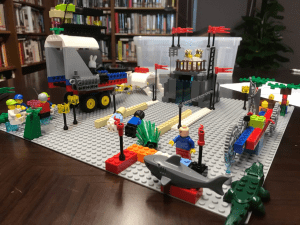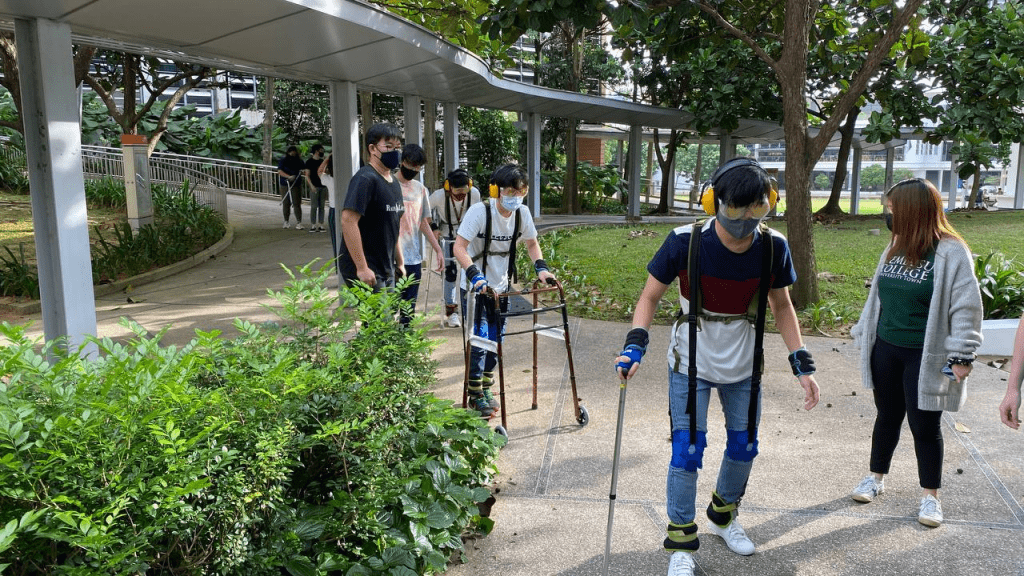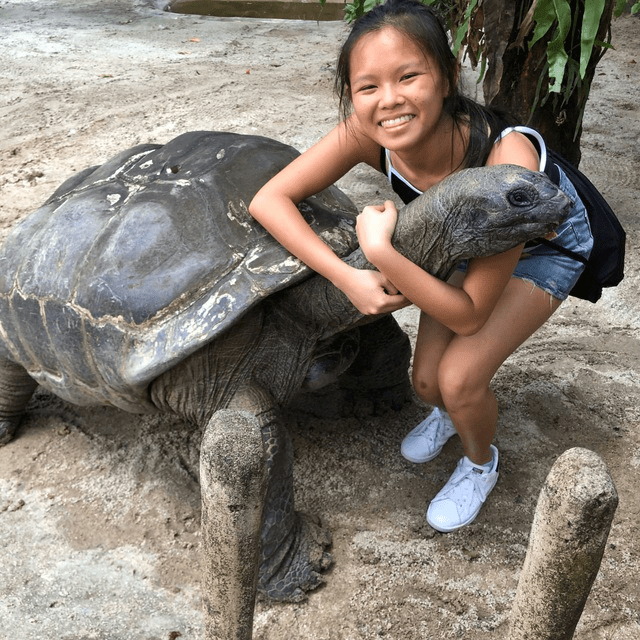One of the biggest selling points of Residential Colleges (RC) in NUS is the unique academic modules they offer. Every RC has a broad but unique theme they focus on – for instance, Ridge View Residential College (RVRC) is known for its focus on sustainability, while the College of Alice and Peter Tan (CAPT) is known for its alignment with community engagement. The modules that each college offers are hence tied to these key themes. In this article, we’ve asked one student from each RC to share with us the details of their favourite module, in hopes that this will help us all gain a broader understanding of the academic programmes that go on in each college. Let’s meet our interviewees!
- Aidan Bakti, College of Alice and Peter Tan (CAPT)
Source: Aidan Bakti
Hi Aidan! Let’s get to know you a little better – do you mind introducing yourself?
Hi everyone! I’m a third year student studying Economics, and I stayed in CAPT for the first two years of university.
What is one module you took at CAPT that you found particularly interesting? Do you mind also sharing your takeaways?
The module I found the most interesting would have to be “Citizenship in a Changing World” (UTC2403/UTS2403), which I took in my second semester of Y2. My tutor was Dr Daniel Jew, although Dr Lavanya Balachandran teaches it too!
This module traces the development of the concept of citizenship, as well as the values and social assumptions underpinning citizenship. Some key themes we tackled included the rights and duties of citizens in relation to government, to other citizens, and to non-citizens. To make matters more interesting, we also studied narratives of citizenship from ancient Greece to contemporary Singapore.
The module was split into classroom sessions, a research presentation and a field project. The field project involved engaging with migrant workers from Bangladesh in an effort to understand our own roles as citizens in relation to non-citizens, as well as the perspectives of migrant workers towards their own citizenship in relation to their government. The end goal of the field project was to aid the migrant workers in obtaining a bursary in order to help their relatives back home who were pursuing further education.

Aidan and his team provide a migrant worker with a bursary for his relatives while celebrating over a meal. (Source: Aidan Bakti)
During the process of obtaining the bursary, we were tasked to find out the necessary details of both the migrant worker and his relative, which was rather difficult due to both language and technical barriers. Through casual conversations over a meal, we also learnt about what life was like for both the migrant workers and their relatives in Bangladesh. This provided me with a better understanding of citizenship, and how the relationship between the state and its citizens can differ across countries. This definitely widened the lens through which I viewed the world and made this module a meaningful one!
2. Natalie Yee, Residential College 4 (RC4)

Source: Natalie Yee
Hi Natalie! Let’s get to know you a little better – do you mind introducing yourself?
Hello everyone, I am currently a second-year resident in RC4 studying Linguistics and English Literature!
What is one module you took at RC4 that you found particularly interesting? Do you mind also sharing your takeaways?
Out of all the modules I have taken at RC4, a module titled “Religion, Governance and Policy Making” (UTC2724/UTS2711) would probably be the most memorable! I took this module in Special Term 2 at the end of my first year and Professor Mustafa Izzudin was the professor instructing this module.
The module covered some big concepts like Social Systems Theory before zooming into religion and the Singapore context, and how religion, governance and policy all influence and intersect with one another.
As a religious person myself, it was very enlightening to learn more about the other religions, and the immense value of interfaith dialogues/interactions in fostering religious harmony in Singapore. Oftentimes to avoid potential conflict and strife, we tend to shy away from having open conversations about our religious beliefs. However, as I have learnt throughout the course of this module, misunderstandings often arise from a lack of understanding of each other’s religion and belief systems, thus educating ourselves and having an open mind to learn is an important first step in building and maintaining religious harmony in Singapore.
Professor Mustafa also did his best to organise field trips and dialogue sessions with different religious leaders in Singapore. These mini field trips outside the classroom were really enjoyable, as we got to see the contents we learnt throughout the module directly applied and in action.
One of the field trips included visiting the Harmony in Diversity gallery.


Source: Harmony in Diversity
I’m glad that I had the opportunity to enrol in this module, as it taught me to step out of my comfort zone to learn and handle sensitive conversations with grace. Religious harmony is central and a marker of the Singaporean identity, thus having a deeper understanding of the role religion plays in Singapore should extend beyond the constraints of a module, as it affects our daily lives in one way or another.
3. Audrey Lim, Ridge View Residential College (RVRC)
Source: Audrey Lim
Hi Audrey! Let’s get to know you a little better – do you mind introducing yourself?
Hi there! I’m currently a second-year resident at RVRC and I am majoring in Communications and New Media.
What is one module you took at RVRC that you found particularly interesting? Do you mind also sharing your takeaways?
The module I found particularly interesting is called “Understanding and Critiquing Sustainability” (GEQ1917). The tutor for the module was Mr Lim Cheng Puay and I took this module over both semesters in my first year!
This module is meant to provide students with foundational knowledge and skills on the topic of sustainability. The first half of the module focuses on exploring the various factors and stakeholders involved in existing and potential environmental issues, while in the second half of the module, we got a chance to work on a semester-long project to address an existing problem that is related to sustainability.

Audrey with her group members: Ng Zi Xuan, Y2, Computer Science; Ren Wei Lin, Y2, Computer Science; and Mannfred Tan, Y2, Linguistics (Source: Audrey Lim)
The most memorable portion of the module was definitely the part where I had to embark on a semester-long group project. After much thought, my group members and I decided to focus our project on helping to promote better park etiquette in visitors who visited the parks. Given the ongoing pandemic, nature reserves and parks have seen a huge increase in the number of visitors. Unfortunately, this has threatened the well-being of our green spaces as many visitors have exhibited signs of bad behaviour during their park visits such as littering and feeding the wild animals they chance upon. We were also surprised to learn that playing music out loud in the parks is discouraged as the noise might scare off the animals or hamper communication between them.

Going on a field trip to Sungei Buloh Nature Reserve (Source: Audrey Lim)
Upon realising that poor park etiquette was a problem, my group decided to implement an app that would guide visitors on the proper park etiquette and also assist them in navigating green spaces in Singapore (for our trial run, we only focused on Sungei Buloh Nature Reserve). While the process was quite tiring and time consuming, it was still memorable nonetheless and we managed to develop a working prototype of our application. Overall, going through the module was a meaningful experience that taught me the importance of taking sustainability seriously, as well as the steps to protect our green spaces in Singapore.



Screengrabs of the app developed by Audrey and her team (Source: Audrey Lim)
4. Tan Yi Jia, Tembusu College

Source: Tan Yi Jia
Hi Yi Jia! Let’s get to know you a little better – do you mind introducing yourself?
Hi everyone! I’m a third year student studying Communications and New Media, and I’ve stayed in Tembusu since Y1.
What is one module you took at Tembusu that you found particularly interesting? Do you mind also sharing your takeaways?
One module I’ve found most enriching and thought-provoking is “Technologies and Ageing in Singapore” (UTS2114), taught by Dr Kuan Yee Han, which I took in Y2S2. From the get-go, the module caught my attention with the interesting teaching methods – from playing with Lego (Lego Serious Play) for learning and ideation, to heading down for field trips to places like the Enabling Village.


Playing with lego to ideate and learn various concepts (Source: Tan Yi Jia)
While the module was primarily focused on understanding how technology could be used to help meet the health and social needs of the elderly in Singapore, we also delved into tough questions regarding mortality through Atul Gawande’s Being Mortal. The reality is that life isn’t just life and death – there’s that period just before death when everyone has to face being old. How do we want ourselves and our elderly relatives to spend that time? For instance, do we want to fight painfully to the death for a longer life, or live a shorter but more fulfilling life with a peaceful end?

Experiencing what an elderly person might feel physically (Source: Tan Yi Jia)
Though I didn’t do exceptionally well for the module, it honestly doesn’t matter to me at all. I’ve learnt so much from this module, and since then I’ve not only treasured my ageing parents so much more but have also begun to think about how my decisions today may impact my end-of-life years. I’ve thus grown more intimate with my own mortality, accepting rather than shunning it to properly consider how I want to spend my final years.
Ultimately, we will all grow old one day, and the technologies we create for the elderly today may one day help to improve the quality of our own lives in the future. It’s therefore definitely not a waste of resources to invest in elderly care technologies, because we’re essentially caring for our future selves.
5. Shermaine Teo, Cinnamon College (University Scholars Programme)

Hi Shermaine! Let’s get to know you a little better – do you mind introducing yourself?
Hi everyone! I’m a third year student studying Life Sciences with a minor in Psychology. I’m also in the University Scholars Programme and I stayed in Cinnamon College for my first two years.
What is one module you took at USP that you found particularly interesting? Do you mind also sharing your takeaways?
One of the more memorable modules I’ve taken in USP is “Reinventing Intercultural Exchanges” (UAR2207) by Dr Miguel Escobar in Y2S1. The module seeks to combine the concepts of intercultural exchanges (definition of culture, cultural differences, intercultural competence, intercultural humility) and digital interfaces (design and analysis of interfaces) to achieve the objective of design and facilitation of computer-mediated intercultural exchanges.
An extremely unique opportunity I had through the module was to carry out online intercultural exchanges with university students from Indonesia and from Czech Republic. The interactions online could never replace in-person exchanges, but working within our means to get to know each other was a real experience in itself. From taking day-in-my-life videos, to exchanging photos of our home cooked meals on Whatsapp, to talking about more sensitive topics over Zoom, our interactions definitely cleared up misconceptions we had about our different cultures and increased our understanding of each other.
Talking to university students from Czeh Republic and Indonesia on Zoom (Source: Shermaine Teo)
Screengrab of a conversation on Whatsapp. (Source: Shermaine Teo)
Some takeaways include learning about how digital tools use cognitive, ludic and interactive aspects to draw users in, exploring the abstract concept of culture and appreciating how every individual is basically a mosaic of the influences and cultures they’ve been exposed to!
Overall, I found the module so interesting because it combined two subject areas that were so out of my comfort zone as a science student. This interdisciplinary aspect of USP modules is really what I enjoy most about them.
_________________________________________________________________
We hope that these interviews have given you a glimpse into what goes on in the classrooms of the different RCs. Apart from the five modules that have been shared by our interviewees, there are so many other interesting modules that residents are taking on campus. If you’re curious to know more, you can always browse the websites of each RC, or find a friend enrolled in an RC to share their takeaways!
Note: Cinnamon College is now a wing under the NUS College – an honours college. Find out more here about the transition.
_________________________________________________________________
Took an interesting residential module? Share with us your takeaways in the comments or DM us on IG @nusresidentiallife!



